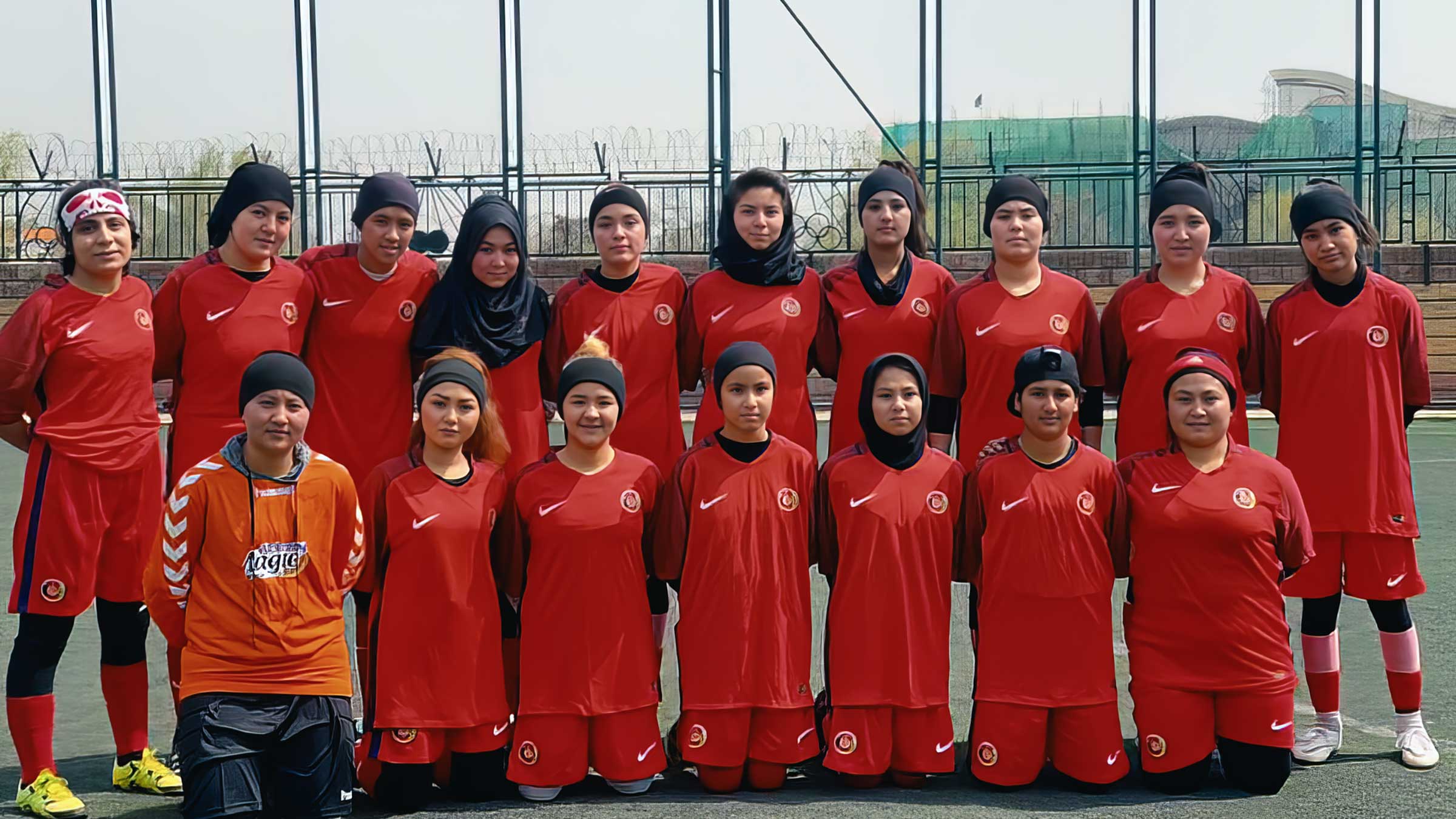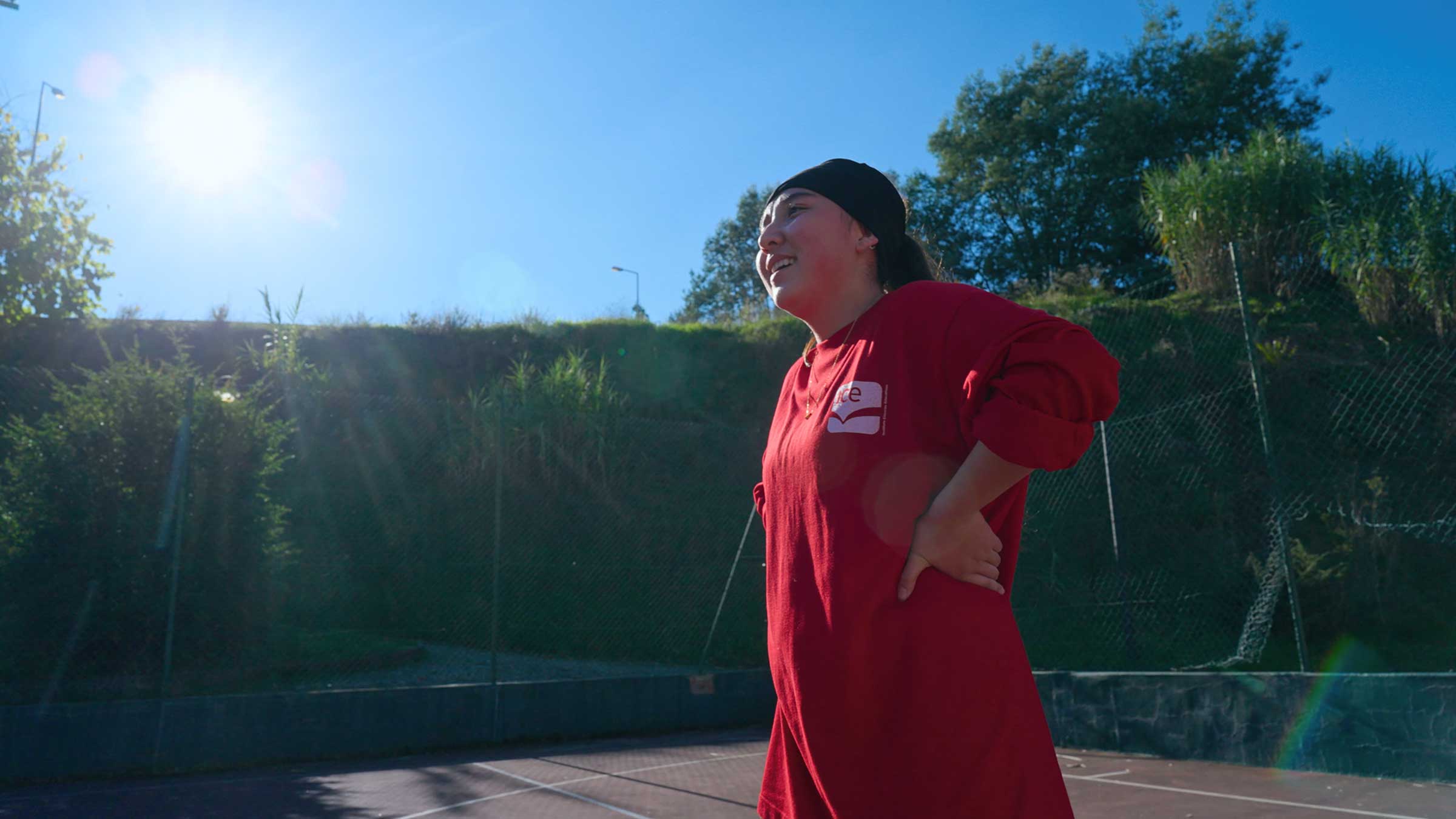Ayenda, co-produced by TIME Studios and executive produced by Trevor Noah, debuts on Sunday, 8/27 at 10pm ET on MSNBC and streaming on Peacock.
Sadaf Shrifzada would have much rather been at home. Instead, she and her teammates on Afghanistan’s under-18 girls soccer team were at practice, in front of a crowd of curious onlookers—photographers, journalists, and news crews—in Lisbon, Portugal of all places.
I’d heard about the girls’ story a few days before they touched down in Portugal, and as a lifelong soccer player and documentary filmmaker, I was compelled to learn more—I quickly hurried across the Atlantic to meet them upon their arrival. A team of young footballers who’d never left home, suddenly in a place where they didn’t know the language, didn’t know the culture, and couldn’t know what the future had in store for them. So you can understand, I’m sure, why Sadaf would have preferred to be at home in Kabul—a place she describes as breathtakingly beautiful, where the people are respectful, generous and kind. A place she never would have left if she didn’t have to.
Her journey had begun a month earlier, when after 20 years of American occupation, the United States withdrew its troops from Afghanistan, and the Taliban overtook the capital city of Kabul with breathtaking and unsettling efficiency.
Terrified of life under Taliban rule, Afghans flocked by the thousands to the airport, desperate to leave a country that no longer felt like it belonged to them. Among the most vulnerable Afghans in Kabul were a group of young women who’d long epitomized a fragile vision of hope in their country, and now symbolized everything the Taliban stood against: the Afghan girls national soccer team.
Sadaf is the captain of the team, who’ve named themselves Ayenda FC—ayenda is the Farsi word for future—since their arrival to Portugal. She’s a natural-born leader with a contagious laugh and a penchant for poetic prose. Sadaf and her teammates knew that under the new regime, they’d likely never go to school again, forget about playing soccer. The Afghan Football Federation desperately made calls around the world on the girls’ behalf, pleading for help to get them out. And in the United States, a group of people who knew all too well how the Taliban’s rule would affect the young women, committed to help.

Robert McReary is a former Green Beret, and Claire Russo, a former Marine. They’d committed much of their careers to promoting democracy in Afghanistan, only to watch those efforts crumble in a matter of days. With the help of former C.I.A. Agent Nic McKinley, Robert and Claire had started leading evacuation efforts earlier that summer. Instead of working through the U.S. government, they operated on their own, through a complicated and murky set of both diplomatic and private channels.
To pull it off, they assembled an all-star team of veterans and special operations experts like them: an Afghan-Canadian soccer player in Toronto named Farkhunda Muhtaj who served as their communications conduit to the girls and private, wealthy donors who funded the operation. After a month-long odyssey through Afghanistan, a number of false starts, and some harrowing near-misses, the girls were finally put on a flight to Portugal. The Portuguese government agreed to give them asylum—and an opportunity to start new lives.
—
I met Sadaf and the rest of the team on that fall day when they were practicing for the first time in their new home. I explained to the girls and their families who I was, and that I had hopes of making a documentary film about their journey out of Afghanistan. Many of them expressed excitement for their story to be told in a film, but none were quite as animated as Sadaf. She marched up to me and proclaimed, ‘I’m Sadaf, I’m 15 years old, and I want to be a filmmaker.’ Delighted by her enthusiasm, I invited her along to a shoot, where our crew showed her how the equipment worked and she asked me questions about being a producer. I was taken with Sadaf’s intellect, optimism and honesty, and she soon became the main character of the film. And then, inevitably, she became my friend.
Over the year and a half that followed, I spent almost every waking minute I had thinking about Sadaf’s story, and how I might portray the harrowing tale of her escape and the complicated joy she’d found as she began her new life. We spoke regularly throughout the making of my short film, Ayenda, and still do. There were moments of inspiration and hope, but also overwhelming uncertainty. Sadaf worried constantly about her mother and younger brother, who were still in Afghanistan. The government transition program in Portugal would only last so long. She struggled not knowing the language or the culture. And even when her mom and brother did eventually make it Portugal, it was a bittersweet reunion. After all, they’d all left behind a life they loved and would never get back.

Meanwhile, Claire and Robert have both struggled with the circumstances of the United States’ withdrawal and the idea that the very reason for their service in Afghanistan—to promote democracy, peace, and equality—was ultimately what put girls like Sadaf in positions of danger under this latest Taliban regime.
Claire and Robert aren’t alone in their questioning of the 20 years of bloodshed and struggle endured by Americans and Afghans alike. In the wake of the United States’ withdrawal from Afghanistan in the summer of 2021, many have wondered: was it all worth it?
A year and a half later, sitting across from Sadaf at her new home in Portugal, it’s impossible to conclude there’s any correct answer besides this one: of course it was worth it.
Listening to her talk about her hopes and dreams for herself and her country, it’s clear that the very existence of young girls like Sadaf is a victory too immense to measure. When she tells me that she hopes to return to Afghanistan someday when it’s peaceful, she has tears in her eyes. But her dismay quickly turns to determination, and she promises to return home with “education, knowledge and big achievements…with my hands full with gifts. I hope to be able to help my country and make it proud.”
I’m so, so sure that she will.
More Must-Reads from TIME
- Cybersecurity Experts Are Sounding the Alarm on DOGE
- Meet the 2025 Women of the Year
- The Harsh Truth About Disability Inclusion
- Why Do More Young Adults Have Cancer?
- Colman Domingo Leads With Radical Love
- How to Get Better at Doing Things Alone
- Michelle Zauner Stares Down the Darkness
Contact us at letters@time.com